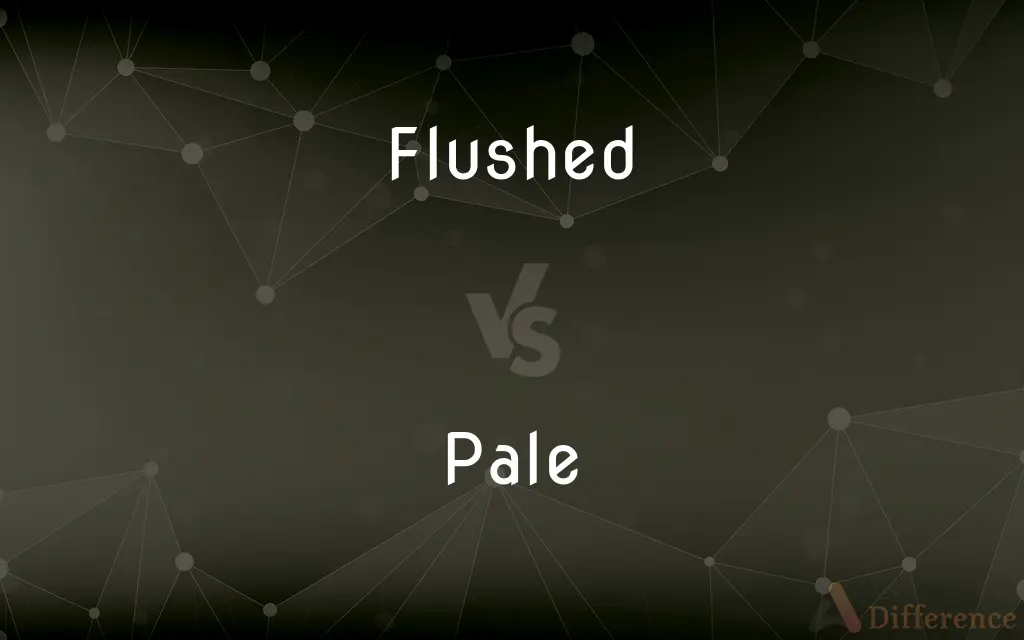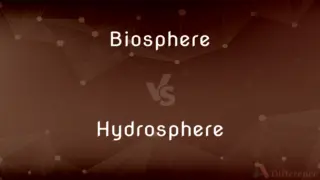Flushed vs. Pale — What's the Difference?
Edited by Tayyaba Rehman — By Fiza Rafique — Updated on May 17, 2024
Flushed refers to a reddish, warm complexion, often from emotions or heat, while pale describes a light or whitish complexion, usually from illness or fear.

Difference Between Flushed and Pale
Table of Contents
ADVERTISEMENT
Key Differences
Flushed skin appears reddish and is often accompanied by warmth. This condition can result from physical exertion, high emotions like embarrassment or anger, or external factors such as hot weather or spicy foods. Pale skin, in contrast, lacks color, appearing lighter than usual. This can be due to various factors, including illness, shock, or anemia, where there is reduced blood flow or oxygen in the blood.
The occurrence of flushed skin is often linked to vasodilation, where blood vessels expand, increasing blood flow to the skin's surface. Conversely, pale skin results from vasoconstriction, where blood vessels narrow, reducing blood flow to the skin.
Both flushed and pale skin can be signs of underlying emotional or physical states. While flushed skin can indicate high activity or emotional arousal, pale skin usually signifies a need for medical attention or a response to stress.
Comparison Chart
Appearance
Reddish, warm complexion
Light, whitish complexion
Common Causes
Emotions (embarrassment, anger), heat, physical exertion
Illness, fear, anemia
ADVERTISEMENT
Blood Flow
Increased blood flow to the skin
Reduced blood flow to the skin
Duration
Often temporary
Can be prolonged depending on the cause
Physical Response
Vasodilation (blood vessels expand)
Vasoconstriction (blood vessels narrow)
Compare with Definitions
Flushed
Appearing red and warm due to increased blood flow.
His face was flushed with excitement.
Pale
Having little color, often appearing whitish or light.
She looked pale after the long illness.
Flushed
Having a reddish complexion, often from heat or emotion.
She was flushed after running the marathon.
Pale
Appearing lighter than usual, often due to fear or shock.
His face turned pale when he heard the news.
Flushed
Characterized by a sudden rush of color to the face.
He felt flushed after drinking the hot soup.
Pale
Light or whitish skin tone.
The pale skin of the vampire contrasted with the dark room.
Flushed
Reddened as a result of physical exertion or strong feelings.
The child’s cheeks were flushed from playing outside.
Pale
Light in colour or shade; containing little colour or pigment
Choose pale floral patterns for walls
Flushed
To turn red, as from fever, embarrassment, or strong emotion; blush.
Pale
Inferior or unimpressive
The new cheese is a pale imitation of continental cheeses
Flushed
To glow, especially with a reddish color
The sky flushed pink at dawn.
Pale
Become pale in one's face from shock or fear
I paled at the thought of what she might say
Flushed
To flow suddenly and abundantly, as from containment; flood.
Pale
Seem or become less important
All else pales by comparison
Flushed
To be emptied or cleaned by a rapid flow of water, as a toilet.
Pale
A wooden stake or post used with others to form a fence.
Flushed
To cause to redden or glow.
Pale
An area within determined bounds, or subject to a particular jurisdiction.
Flushed
To excite or elate
The team was flushed with the success of victory.
Pale
A broad vertical stripe down the middle of a shield.
Flushed
To clean, rinse, or empty with a rapid flow of a liquid, especially water
Flush a toilet.
Flush a wound with iodine.
Pale
A stake or pointed stick; a picket.
Flushed
To drive away with a rapid flow of a liquid
Flush debris from a pipe.
Pale
A fence enclosing an area.
Flushed
To remove or eliminate
"The weakness in demand and productivity will at least ... flush out some of the inflation premium that has been built into interest rates" (Fortune).
Pale
The area enclosed by a fence or boundary.
Flushed
To frighten (a game bird, for example) from cover.
Pale
A region or district lying within an imposed boundary or constituting a separate jurisdiction.
Flushed
To drive or force into the open
The police fired tear gas to flush out the terrorists.
Pale
Pale The medieval dominions of the English in Ireland. Used with the.
Flushed
To dart out or fly from cover.
Pale
(Heraldry) A wide vertical band in the center of an escutcheon.
Flushed
A flooding flow or rush, as of water.
Pale
To enclose with pales; fence in.
Flushed
The act of cleaning or rinsing by or as if by flushing.
Pale
To cause to turn pale.
Flushed
A blush or glow
"here and there a flush of red on the lip of a little cloud" (Willa Cather).
Pale
To become pale; blanch
Paled with fright.
Flushed
A reddening of the skin, as with fever, emotion, or exertion.
Pale
To decrease in relative importance.
Flushed
A brief sensation of heat over all or part of the body.
Pale
Whitish in complexion; pallid.
Flushed
A rush of strong feeling
A flush of pride.
Pale
Of a low intensity of color; light.
Flushed
A state of great vigor or development.
Pale
Having high lightness and low saturation.
Flushed
A bird or flock of birds that has been frightened from cover.
Pale
Of a low intensity of light; dim or faint
"a late afternoon sun coming through the el tracks and falling in pale oblongs on the cracked, empty sidewalks" (Jimmy Breslin).
Flushed
So as to be even, in one plane, or aligned with a margin.
Pale
Feeble; weak
A pale rendition of the aria.
Flushed
Squarely or solidly
The ball hit him flush on the face.
Pale
Light in color.
I have pale yellow wallpaper.
She had pale skin because she didn't get much sunlight.
Flushed
Red in the face because of embarrassment, exertion, etc.
Pale
(of human skin) Having a pallor (a light color, especially due to sickness, shock, fright etc.).
His face turned pale after hearing about his mother's death.
Flushed
Simple past tense and past participle of flush
Pale
Feeble, faint.
He is but a pale shadow of his former self.
The son's clumsy paintings are a pale imitation of his father's.
Flushed
Having the pinkish flush of health
Pale
(intransitive) To turn pale; to lose colour.
Flushed
(especially of the face) reddened or suffused with or as if with blood from emotion or exertion;
Crimson with fury
Turned red from exertion
With puffy reddened eyes
Red-faced and violent
Flushed (or crimson) with embarrassment
Pale
(intransitive) To become insignificant.
Flushed
Temporary redness of the skin.
Her face became flushed during the heated debate.
Pale
(transitive) To make pale; to diminish the brightness of.
Pale
To enclose with pales, or as if with pales; to encircle or encompass; to fence off.
Pale
(obsolete) Paleness; pallor.
Pale
A wooden stake; a picket.
Pale
(archaic) Fence made from wooden stake; palisade.
Pale
(by extension) Limits, bounds (especially before of).
Pale
The bounds of morality, good behaviour or judgment in civilized company, in the phrase beyond the pale.
Pale
(heraldry) A vertical band down the middle of a shield.
Pale
(archaic) A territory or defensive area within a specific boundary or under a given jurisdiction.
Pale
(historical) The parts of Ireland under English jurisdiction.
Pale
(historical) The territory around Calais under English control (from the 14th to 16th centuries).
Pale
(historical) A portion of Russia in which Jews were permitted to live.
Pale
(archaic) The jurisdiction (territorial or otherwise) of an authority.
Pale
A cheese scoop.
Pale
Wanting in color; not ruddy; dusky white; pallid; wan; as, a pale face; a pale red; a pale blue.
Speechless he stood and pale.
They are not of complexion red or pale.
Pale
Not bright or brilliant; of a faint luster or hue; dim; as, the pale light of the moon.
The night, methinks, is but the daylight sick;It looks a little paler.
Pale
Paleness; pallor.
Pale
A pointed stake or slat, either driven into the ground, or fastened to a rail at the top and bottom, for fencing or inclosing; a picket.
Deer creep through when a pale tumbles down.
Pale
That which incloses or fences in; a boundary; a limit; a fence; a palisade.
Pale
A space or field having bounds or limits; a limited region or place; an inclosure; - often used figuratively.
Pale
A region within specified bounds, whether or not enclosed or demarcated.
Pale
A stripe or band, as on a garment.
Pale
One of the greater ordinaries, being a broad perpendicular stripe in an escutcheon, equally distant from the two edges, and occupying one third of it.
Pale
A cheese scoop.
Pale
A shore for bracing a timber before it is fastened.
Pale
To turn pale; to lose color or luster.
Apt to pale at a trodden worm.
Pale
To make pale; to diminish the brightness of.
The glowworm shows the matin to be near,And 'gins to pale his uneffectual fire.
Pale
To inclose with pales, or as with pales; to encircle; to encompass; to fence off.
[Your isle, which stands] ribbed and paled inWith rocks unscalable and roaring waters.
Pale
A wooden strip forming part of a fence
Pale
Turn pale, as if in fear
Pale
Very light colored; highly diluted with white;
Pale seagreen
Pale blue eyes
Pale
(of light) lacking in intensity or brightness; dim or feeble;
The pale light of a half moon
A pale sun
The late afternoon light coming through the el tracks fell in pale oblongs on the street
A pallid sky
The pale (or wan) stars
The wan light of dawn
Pale
Lacking in vitality or interest or effectiveness;
A pale rendition of the aria
Pale prose with the faint sweetness of lavender
A pallid performance
Pale
Abnormally deficient in color as suggesting physical or emotional distress;
The pallid face of the invalid
Her wan face suddenly flushed
Pale
Not full or rich;
High, pale, pure and lovely song
Pale
A complexion that lacks normal color.
The pale complexion of the patient concerned the doctor.
Pale
Indicating a lack of blood flow or oxygen.
She went pale with fright during the scary movie.
Common Curiosities
What causes pale skin?
Pale skin is caused by reduced blood flow or oxygen in the blood, often due to illness, fear, anemia, or shock.
Is flushed skin always a sign of fever?
Not necessarily. Flushed skin can also result from emotions, heat, or physical activity without a fever.
Is pale skin a cause for concern?
Pale skin can indicate an underlying health issue or emotional response and may require medical attention.
What causes flushed skin?
Flushed skin is caused by increased blood flow due to emotions, heat, physical exertion, or spicy foods.
How can I improve pale skin?
Addressing the underlying cause, such as treating an illness or managing stress, can help improve pale skin.
Can exercise cause flushed skin?
Yes, physical exertion increases blood flow to the skin, causing a flushed appearance.
Can medication cause flushed skin?
Yes, some medications can cause vasodilation, leading to flushed skin as a side effect.
Is flushed skin harmful?
Flushed skin is generally not harmful and usually resolves on its own unless it persists or is accompanied by other symptoms.
Can fear cause flushed skin?
Fear typically causes pale skin due to vasoconstriction, but initial shock or embarrassment might cause flushing.
Is pale skin a sign of dehydration?
Pale skin can be a sign of dehydration, especially if accompanied by other symptoms like dizziness and dry mouth.
Is it normal for skin to flush during exercise?
Yes, it is normal for skin to flush during exercise due to increased blood flow to the surface of the skin.
Can stress cause pale skin?
Yes, stress can cause vasoconstriction, reducing blood flow and resulting in pale skin.
How can I reduce flushed skin?
Cooling down, relaxing, and avoiding triggers like spicy foods can help reduce flushed skin.
Why does spicy food cause flushed skin?
Spicy food can cause blood vessels to dilate, increasing blood flow to the skin and causing a flushed appearance.
Why does anemia cause pale skin?
Anemia reduces the number of red blood cells, decreasing oxygen delivery to the skin, which causes a pale appearance.
Share Your Discovery

Previous Comparison
Term vs. Trimester
Next Comparison
Biosphere vs. HydrosphereAuthor Spotlight
Written by
Fiza RafiqueFiza Rafique is a skilled content writer at AskDifference.com, where she meticulously refines and enhances written pieces. Drawing from her vast editorial expertise, Fiza ensures clarity, accuracy, and precision in every article. Passionate about language, she continually seeks to elevate the quality of content for readers worldwide.
Edited by
Tayyaba RehmanTayyaba Rehman is a distinguished writer, currently serving as a primary contributor to askdifference.com. As a researcher in semantics and etymology, Tayyaba's passion for the complexity of languages and their distinctions has found a perfect home on the platform. Tayyaba delves into the intricacies of language, distinguishing between commonly confused words and phrases, thereby providing clarity for readers worldwide.













































